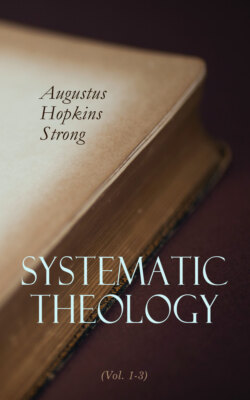Читать книгу Systematic Theology (Vol. 1-3) - Augustus Hopkins Strong - Страница 92
На сайте Литреса книга снята с продажи.
V. Objections to the Doctrine of Inspiration.
ОглавлениеTable of Contents
In connection with a divine-human work like the Bible, insoluble difficulties may be expected to present themselves. So long, however, as its inspiration is sustained by competent and sufficient evidence, these difficulties cannot justly prevent our full acceptance of the doctrine, any more than disorder and mystery in nature warrant us in setting aside the proofs of its divine authorship. These difficulties are lessened with time; some have already disappeared; many may be due to ignorance, and may be removed hereafter; those which are permanent may be intended to stimulate inquiry and to discipline faith.
It is noticeable that the common objections to inspiration are urged, not so much against the religious teaching of the Scriptures, as against certain errors in secular matters which are supposed to be interwoven with it. But if these are proved to be errors indeed, it will not necessarily overthrow the doctrine of inspiration; it will only compel us to give a larger place to the human element in the composition of the Scriptures, and to regard them more exclusively as a text-book of religion. As a rule of religious faith and practice, they will still be the infallible word of God. The Bible is to be judged as a book whose one aim is man's rescue from sin and reconciliation to God, and in these respects it will still be found a record of substantial truth. This will appear more fully as we examine the objections one by one.
“The Scriptures are given to teach us, not how the heavens go, but how to go to heaven.” Their aim is certainly not to teach science or history, except so far as science or history is essential to their moral and religious purpose. Certain of their doctrines, like the virgin-birth of Christ and his bodily resurrection, are historical facts, and certain facts, like that of creation, are also doctrines. With regard to these great facts, we claim that inspiration has given us accounts that are essentially trustworthy, whatever may be their imperfections in detail. To undermine the scientific trustworthiness of the Indian Vedas is to undermine the religion which they teach. But this only because their scientific doctrine is an essential part of their religious teaching. In the Bible, religion is not dependent upon physical science. The Scriptures aim only to declare the creatorship and lordship of the personal God. The method of his working may be described pictorially without affecting this substantial truth. The Indian cosmogonies, on the other hand, polytheistic or pantheistic as they are, teach essential untruth, by describing the origin of things as due to a series of senseless transformations without basis of will or wisdom.
So long as the difficulties of Scripture are difficulties of form rather than substance, of its incidental features rather than its main doctrine, we may say of its obscurities as Isocrates said of the work of Heraclitus: “What I understand of it is so excellent that I can draw conclusions from it concerning what I do not understand.” “If Bengel finds things in the Bible too hard for his critical faculty, he finds nothing too hard for his believing faculty.” With John Smyth, who died at Amsterdam in 1612, we may say: “I profess I have changed, and shall be ready still to change, for the better”; and with John Robinson, in his farewell address to the Pilgrim Fathers: “I am verily persuaded that the Lord hath more truth yet to break forth from his holy word.” See Luthardt, Saving Truths, 205; Philippi, Glaubenslehre, 205 sq.; Bap. Rev., April, 1881: art. by O. P. Eaches; Cardinal Newman, in 19th Century, Feb. 1884.
